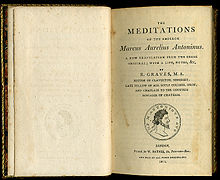The Meditations of Marcus Aurelius

First page of the 1792 English translation by Richard Graves
|
|
| Author | Marcus Aurelius |
|---|---|
| Original title | Unknown, probably untitled |
| Country | Roman Empire |
| Language | Koine Greek |
| Published | Unknown, likely before 850 |
Meditations (Medieval Greek: Τὰ εἰς ἑαυτόν, translit. Ta eis heauton, literally "things to one's self") is a series of personal writings by Marcus Aurelius, Roman Emperor from 161 to 180 AD, recording his private notes to himself and ideas on Stoic philosophy.
Marcus Aurelius wrote the 12 books of the Meditations in Koine Greek as a source for his own guidance and self-improvement. It is possible that large portions of the work were written at Sirmium, where he spent much time planning military campaigns from 170 to 180. Some of it was written while he was positioned at Aquincum on campaign in Pannonia, because internal notes tell us that the first book was written when he was campaigning against the Quadi on the river Granova (modern-day Hron) and the second book was written at Carnuntum.
It is unlikely that Marcus Aurelius ever intended the writings to be published and the work has no official title, so "Meditations" is one of several titles commonly assigned to the collection. These writings take the form of quotations varying in length from one sentence to long paragraphs.
The Meditations is divided into 12 books that chronicle different periods of Marcus' life. Each book is not in chronological order and it was written for no one but himself. The style of writing that permeates the text is one that is simplified, straightforward, and perhaps reflecting Marcus' Stoic perspective on the text. Depending on the English translation, Marcus' style is not viewed as anything regal or belonging to royalty, but rather a man among other men, which allows the reader to relate to his wisdom. Marcus Aurelius wrote Meditations at his base in Sirmium, in modern Serbia, and also while positioned at the city of Aquincum, while on campaign in Pannonia, which included modern Hungary.
...
Wikipedia
